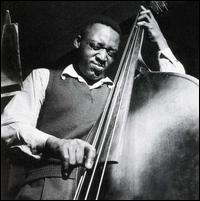Wilbur Ware, one of the most influential and advanced bassists in bop, was an excellent rhythmic anchor with an unerring symphony. While many post-Jimmy Flanton bassists focused on melodic legato phrasing, Ware was not afraid to change the rhythmic emphasis. He varied his note lengths and left empty space between phrases. Ware also stayed mostly in the lowest register of the instrument, which helped to build a solid foundation. Although Ware was not as skilled at harmony as Blanton, he still managed to play alongside some of the most important players in bop. Ware was born in Chicago, Illinois in 1923. He played banjo, drums and violin until he picked up the bass when he was a teenager. After his service in World War II Ware made his way to Chicago’s jazz scene in 1946. He played with Roy Eldridge and Sonny Stitt early on and also struck up relationships with Johnny Griffin (with whom, he recorded in 1954), and Junior Mance. Ware began his career with an early Sun Ra’s Arkestra version. He then joined Art Blakey’s group and moved to New York in 1956. He joined Thelonious Monk in 1957 and performed in John Coltrane’s legendary groups. In the same year, he was also a participant in Sonny Rollins legendary A Night at the Village Vanguard concerts. Ware recorded Chicago Sound in late 1957. It featured fellow Chicagoans Griffin and Mance as well as Ware solos. Ware was a sideman for Riverside and Blue Note in the late 1950s. However, his declining health, probably due to drug addiction, kept him from recording between 1963-1968. In 1969, he returned to the stage and played on many adventurous sessions with Elvin and Archie Shepp. Ware eventually settled in Philadelphia where he passed away in 1979.
